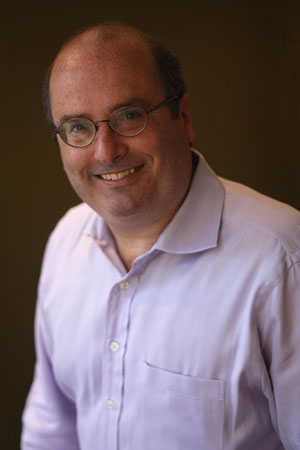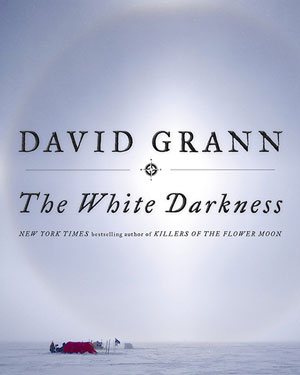Exploring Endurance
Best-selling author David Grann (GRS’94) on one man’s obsessive quest to cross Antarctica

Polar explorer Henry Worsley is the subject of David Grann’s new book, The White Darkness, based on his 2018 New Yorker story. Photos courtesy of Doubleday
Exploring Endurance
Best-selling author David Grann (GRS’94) on one man’s obsessive quest to cross Antarctica
In 2015, decorated British army officer Henry Worsley set off on a dangerous journey. His goal was to become the first person to cross Antarctica alone, part of an obsession to accomplish what his lifelong hero, polar explorer Ernest Shackleton, did not.
Worsley made it more than 800 miles across the ice, before exhaustion felled him about 100 miles short of his goal. He died in a Chilean hospital two days after being rescued.
Writer David Grann (GRS’94) tells Worsley’s story in his new book, The White Darkness (Doubleday, 2018), based on the explorer’s private diaries, public dispatches, and numerous interviews.
Worsley’s is a tragic tale about the limits of human endurance, told by a prolific journalist with a golden touch for turning untold stories into best sellers. Grann’s 2017 book, Killers of the Flower Moon (Doubleday), a National Book Award finalist, is set to become a film directed by Martin Scorsese. And two of his New Yorker stories, “Trial by Fire,” about the junk science that led to a Texas man’s execution, and “The Old Man and the Gun,” about an aging bank robber, have recently been made into movies planned for wide release (the latter starring Robert Redford, Sissy Spacek, and Tom Waits and nominated for a Golden Globe). His 2010 book, The Lost City of Z (Vintage Books), was also turned into a movie.
“I try not to get too caught up in it all,” says Grann, a staff writer at the New Yorker for 16 years. “I really just want to focus on my writing books and stories. If the movie’s great, I’ll say I had everything to do with it and if it’s bad, I say I didn’t.”
The White Darkness arrived when Worsley’s feat was back in the news. In December, two explorers—one American, one British—each finished solo treks across Antarctica.

BU Today spoke with Grann about what drew him to Henry Worsley and what The White Darkness says about the myths surrounding leadership and perseverance. The interview was edited and condensed for clarity.
BU Today: Worsley’s fixation with Antarctica led him to make the trek across some of the most treacherous terrain on the planet with two fellow explorers before returning to try it again solo. Would you describe Worsley as a hero?
Grann: I guess when I write about people, I don’t think so much in those terms: Is someone a hero? Is someone a villain? I think about who they are and about their character and their traits. There was a lot about Worsley that I admired: his courage, his perseverance, the way he treated people. I admired the way he treated other soldiers or people in his expedition; he had a real humane quality to him. And one of the things that really interested me about him was that he was almost a polymath, he had so many different hobbies and interests that he did well. He parachuted, he did horticulture, he was a painter, a sculptor. He loved tatting [intricate lace-making], and he’d go into prison to teach it. I found him a wonderfully fascinating subject.
What made you want to tell his story?
When I was young, I liked reading about polar explorers. I loved reading Jack London novels. But I had never been to Antarctica, and I kind of hate the cold, so I always liked to read those stories from the warmth of a living room, maybe by a nice fire. When I came across the story in 2015 that Worsley was planning to do what his hero Shackleton had attempted to do a century earlier, which was essentially walk across Antarctica, I was immediately drawn to the story, partly because it is one of the greatest feats of endurance. Nobody had ever done what he was attempting to do and done it unsupported. As I did a little more research, I learned it was also this kind of remarkable love story between Worsley and a place, Antarctica, and between Worsley and his family—and the tension between both those two loves.
I often think for stories you want them to tell you something larger about the human condition, whether you’re a polar explorer or not. And I did think his story really tells us something about the nature of leadership.
What do you think drove Worsley?
I’m always somebody who tries to let the story speak for itself and not speculate too much on the psychological forces. But I do think when you talk to Henry’s family members, he had a father who was this revered, commanding figure in the highest, highest ranks of the British Army, someone who was knighted and who loomed over his life. He was often absent in the military and overseas, and Henry was sent to boarding school at a very young age. I think there is a father-son relationship that is present and that plays some role in everyone’s life and certainly in Henry’s. The polar expeditions were, in some way, how he could prove his own mettle and do it in a realm that was different than his father’s.
You describe the desolation of the landscape vividly. Did you visit Antarctica?
That was not in the cards, not possible for this story. At first, one of the hardest things for me was to wrap my mind around Antarctica because it’s really more like Mars than anyplace on Earth. It’s the coldest, windiest continent; it’s covered in an ice sheet, but it’s the driest continent. It’s just this kind of alien realm.
I was blessed by the fact that Worsley meticulously documented his expedition and the family generously had given me access to his diaries. I had his audio dispatches and his photographs. In some ways, while I didn’t go to Antarctica, I had never felt as close to a subject as I did to Worsley. I felt like I was walking beside him.
In writing about Worsley’s final expedition, did you ever just say to yourself, this journey is unnecessary or plain reckless?
I sometimes have internal conversations with people I write about and I felt that way certainly with The Lost City of Z, when I wrote about Colonel Percy Fawcett, the lost British explorer who disappeared in the Amazon [in the 1920s] and who took his son with him on his last expedition. I would often say, “Well, why did you do that?”
I don’t know if with Henry I had quite that reaction. Henry was doing something I would never do to begin with. But my approach is to show all sides of somebody and their decisions, so rather than me reaching that judgment, the reader can follow Henry and have that conversation with him.
I know Henry’s wife, Joanna, struggled to understand these expeditions and was really worried about his last one. He was older [age 55] and the risk was high. He was also a remarkable explorer and someone who had never failed at anything else before—he had always persevered and always conquered by will, and that was also part of his character.
Of course, he has to struggle with his limitations at the end. That’s really the crux of the book, which is, what is the meaning of Shackleton’s leadership and what is the meaning of leadership? Is it always to persevere? We like to think we can always prevail. There’s a kind of myth to that, a romance to that. But there are times when one confronts one’s own limitations, and certainly that is true in Antarctica.
In some ways, it’s one of the most painful things to come to terms with—failure. I think one of the things that makes Worsley’s story so tragic is that he was so close to the end of his trip. He persevered the way he had always persevered, and he was on the verge of collapse; he was not really able to put one ski in front of another. He spent a day holed up in his tent trying to decide what to do. And he ultimately did decide to come off the ice and call for a rescue plane. I do think he actually arrived and understood that deeper meaning.
You came to BU’s Creative Writing Program to write fiction. What changed along the way?
Certainly the way I write was very much influenced by the teachers that I had there. People like [College of Arts & Sciences professor of English] Leslie Epstein, who taught me about attention to detail and observation, showing things as they happen.
When I was at BU, I tried my hand at fiction and one of the things it taught me was that I wasn’t very good at fiction. So it led me to do nonfiction, and in some ways, it helped me learn what kind of writing was best suited for me. That was really important and a real change.
How do you find your stories?
I try to read a fair amount, newspaper briefs, local newspapers; it’s a great way to find a thread of a much larger narrative contained in a couple sentences. You look for that. I’m always listening to people. I will sometimes randomly cold-call people I think are interesting. I’ll just call historians or someone involved in law enforcement, maybe someone who knows a lot about espionage or art.
The hardest thing is to find the story and to some degree what you write is only as good as the story you’re telling.
In writing The White Darkness, you got to know Lou Rudd, Worsley’s friend and fellow polar explorer. There has been a lot of coverage of Rudd’s 2018 race against American Colin O’Brady for the claim to be the first to trek across Antarctica alone. (O’Brady beat Rudd by two days.) Were you rooting for a winner?

Rudd was on the second expedition with Worsley, so I got to know Lou a little bit and spoke to him before he set off.
When Lou went off, he just thought he was going to be doing this alone, so he had no concept that there would be a race. He didn’t know about O’Brady until he was already there. That was something he had not originally pondered, adding some level of stress and difficulty to something that was already strenuous and difficult. O’Brady is obviously much younger and had undertaken these athletic feats. Lou probably has more experience with Antarctica because he’s a soldier and he’s older.
Both men succeeded, which doesn’t seem like a story you’d want to write.
I will say that I am always more interested in failure than success. And when I’m given an option, whether in a sporting locker room or the presidential election, to choose the winner or loser, I will always go to the loser’s side.
There’s more pathos and people are wrestling with something that is more difficult than success. I think you can learn something from that. People will reveal themselves, or they’re more likely to. I think failure, in some ways, is the hardest thing to cope with, something we like to gloss over in our self-help and leadership books that preach, “You always prevail, you always win.” Truth is, you don’t. How you deal with those limitations and those failures is very telling because it’s as integral to human existence as prevailing.
Comments & Discussion
Boston University moderates comments to facilitate an informed, substantive, civil conversation. Abusive, profane, self-promotional, misleading, incoherent or off-topic comments will be rejected. Moderators are staffed during regular business hours (EST) and can only accept comments written in English. Statistics or facts must include a citation or a link to the citation.